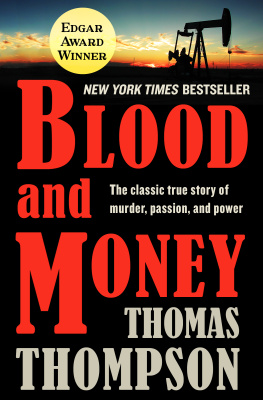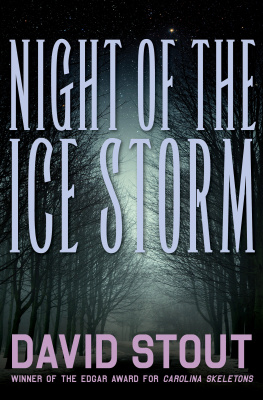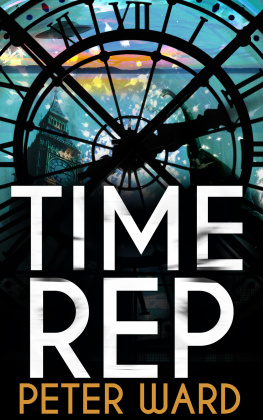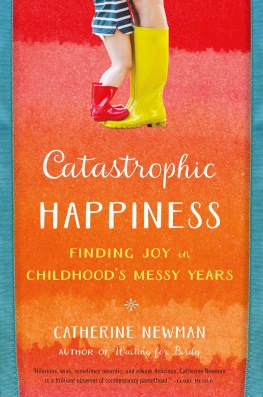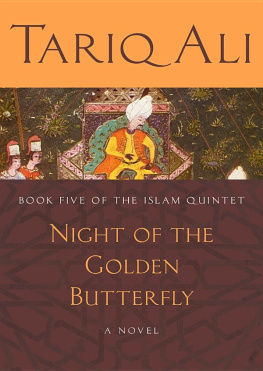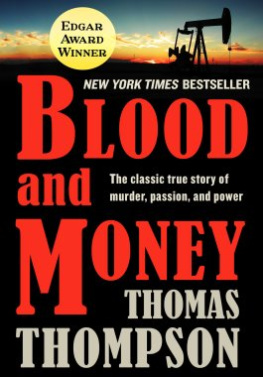Blood and Money
Thomas Thompson

This is for my brother,
Larry D. Thompsona good
friend and a good lawyer.
Book One
JOAN
Behold a pale horse
ONE
During the night an early spring rain washed the city and now, at dawn, the air was sweet and heavy. Remnants of fog still held to the pavements of Houston, rolling across the streets like cobweb tumbleweeds, and the windshields of early commuters were misted and dangerous. The morning seemed sad, of little promise.
In his bed, the old man sweated and tossed. This night had been worse than most. He had awakened over and over again, and each time he checked the clock. He was impatient for the new day to commence so that he could order the flowers. One hundred perfect yellow roses would surely please his daughter. Not until he saw her laugh again would he sleep well.
Once, during the long darkness, he turned on the light and looked at the photographs which surrounded his bed. Above his head was Joan from a quarter century ago, when she was a child in best white organdy, her knee saucily crossed. To his right, on the wall, was Joan in her late teens, her beauty frozen by soft focus, her features glazed, the classic debutante. And to his left, on the old Grand Rapids dresser, was Joan in recent years, her face ablaze with the triumph of yet another win in the show ring. There were a thousand like these in the big house, filling the walls, pasted into scrapbooks, stuffed into drawers, spilling out of closets. Joan and her horses had become favorite subjects of photographers across the land, and the old mans home was a museum of her image.
But even these familiar suspensions of time could not push away the scene from the night before. Each time he bolted awake, sitting up in bed, throwing a hand across his face to smear the dampness from his eyes, it was still there in all the torment.
Joan, honey? He had crept a few steps into the hospital room. It smelled of sterile potions and pain. Two nurses were busy about his daughter with tubes and medical contraptions.
Pa? she answered weakly. Normally her voice could boom clear across a cornfield. Her pillow was slightly raised, and on it her hair spilled thin and lifeless, no longer silver white and electric like a noon sun.
They wont let me stay, honey, he said, fumbling for comfort. You hurry up and get well, now, and tomorrow morning when you wake up Im gonna fill your room with yellow roses.
Joan tried to smile. Id like that, Pa, she murmured.
Daddys gonna do that, Joan, he said. You know Daddys gonna do that.
Then one of the nurses pushed expelling hands toward him and he left the room. He stopped for a moment outside and leaned his heavy body against the wall. His heart pumped in alarm. Hadnt the doctors said she would be all right? They had, he reassured himself. He went in search of another one just to hear the words again.
When the door chimes rang just before 6 A.M. , the old man heard them. For an instant, in his bed, he opened his eyes and wondered who could be seeking entrance to his home so early, so unexpectedly. But he was weary, not yet ready to wake, and when he heard Ma stirring, he closed his eyes and fell back.
The old woman padded to the front door and opened it with good will. Perhaps, she thought, a neighbor is in distress. But when she saw the people with the gray and tragic faces standing at her threshold, looming out of the mist and fog, her knees buckled. They did not have to speak a word. She knew. She knew exactly what they had come to tell her.
Oh, my God, the old woman managed as she fell. Pitifully she began to retch, throwing up the whiskey that had helped her find sleep the night before. Her son-in-law, John Hill, watched, but he did not reach down to pick her up. Although a doctor, he lacked the will at this terrible moment. One of the friends who had come with him, another physician, knelt to help Ma. He grasped her gently and lifted her and walked her to the living room. There she fell, breathing hard, onto the sofa. John Hill watched her for a few moments, then he took a tentative step toward the back bedroom where the old man was sleeping. Clearly he dreaded to make this short journey.
It was not Mas nature to command anyone, for she was a woman who lived an obedient step or two behind her husband and her daughter. Her world was their shadows, and drawn blinds. But now she threw out her hand with an edict.
Dont wake Pa, she said urgently. For Gods sake, let him sleep. This is the last night he ever will.
And they all sat and waited, fearfully, for Pa to wake and rise and hear the news.
TWO
He was a paradox, the old man, Pa. With one clenched fist rising in the direction of the beyond, he cursed God, for he had no tolerance for the foolishness of religion. Yet with the other he touchedin wonderone of his most beloved possessions, an ivory Madonna that Christian warriors had borne through the Crusades, her back smoothed and worn from the frightened kisses of those seeking divine blessing. With one breath he scoffed at the notion of an afterlife. An awful lot of SOBs sit on the front row of the church house, Pa often said, and if I had to spend eternity with them, you couldnt drag me into heaven with six mules! But with the next, he likely as not would tell of his fascination for the ancient royal houses of Egypt and his knowledge of their elaborate preparations for the journey to the other side.
When Joan was tiny she often sat in Pas lap and heard him speak of Radames and Nefertiti and Tutankhamen: They tell me that old King Tut was buried in a coffin that weighs twenty-four hundred pounds and is pure solid gold. Imagine that, Joanie! Solid gold! Well see it someday. You and me are gonna see it all! Across the map of Egypt marched his twin fingers, strong and gnarled from the rocks and earth of the fields he explored in search of oil, whisking father and daughter across the seas.
Now if you stood the man against the wall and measured him, he was, on surface viewing, the stereotypic model of the Texas oil creature from the wide-brimmed felt hat down to the gleaming black Lincoln automobile he drove at hurtling speeds about the freeways of Houston, a cassette of Eddie Arnolds country melodies soothing him from the tape deck. A quail had slight chance if it flew past the sights of his shotgun, nor did many wide-mouthed bass swim on if they chanced to nibble at his line. His politics veered to the right of Calvin Coolidge, and liberal Democrats, to his thinking, were as dangerous as a snake in his swimming pool. He would not invite a black man to sit at his dinner table, or even enter the house through the front door, but should one arrive with a load of earth to freshen his azalea beds, he might sit in the sun and talk for hours of children and creaking bones and browning blossoms, like a life of rich promise so suddenly going away. He began most every morning with several cups of strong hot coffee and an hour or two of spirited talk with a table full of affluent cronies, in assemblage at the Houston Club, a Klatsch of elderly men whose breast pockets might contain, side by side, the report of a new East Texas gas well, the photograph of a grandson, and the vial of digitalis. But there was more to Pa than gold and vinegar. There were secrets he kept from the others. Had he faced a firing squad and been told that his life would be spared only if he could quote from memory great chunks of Longfellow and Keats and Shakespeare, then he would walk away free and alive. He could read a little Greek, and Latin, and might hold his own in the company of scholars. But Pa insisted on presenting himself as a robust buccaneer, and he would never admit to the others at the coffee table that

